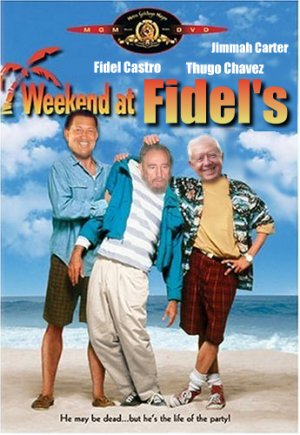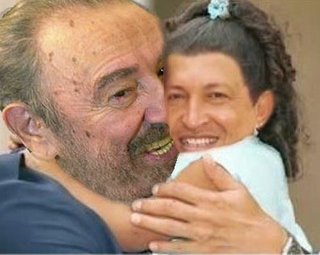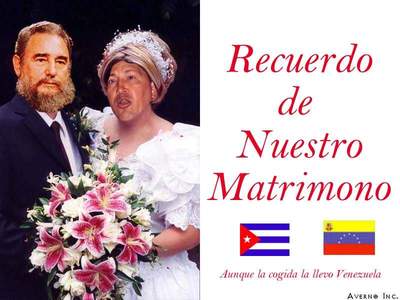According to White House spokeswoman Dana Perino, the defeat of Chavez's reforms "bodes well" for "freedom and liberty." If Perino means it bodes well for Chavez, and liberty and freedom under Chavez, she's right.
According to opposition leader Leopoldo Lopez, Venezuela's vote yesterday was "about democracy or totalitarian socialism, and democracy won." But if Chavez were truly a totalitarian, would he have allowed a vote at all? And would he have conceded his defeat?
Ironically, Chavez's defeat is a victory for Chavez and a defeat for those who oppose him because it dramatically undermines the central claim of the opposition, and the U.S., that Chavez is a dictator who rigs elections.
Here in the U.S. of A, the claim that Chavez is a dictator, tyrant, etc. is widely and bipartisanly accepted by conservatives and liberals, Republicans and Democrats, who liberally throw around the "d" word when referring to Chavez.
It's not just Donald Rumsfeld who compares Chavez to Hitler, (a comparison, which, I imagine, would be rejected by most Holocaust survivors and people who risked their lives and were wounded fighting against the REAL Hitler). It's not just Geraldo Rivera who calls Chavez a "Communist Dictator," although in all seriousness, a dis from Geraldo is seen as a props by most people. Even the righteous (and foxy) Keith Olbermann clumps Castro's Cuba and Chavez's Venezuela together.
This common, slightly racist, fairly ignorant, and and very ahistorical view, which sees all of Latin American Left Leaning Leaders as one, and sees Castro and Chavez as identical (represented in these "funny because they are stupid" photos that are all over the "internets," and who is Jimmah Carter?), raises an important point: Castro is a dictator, while Chavez is not. I don't care if you like Castro. He is still a dictator, even if you think he is fairer and more egalitarian than many elected leaders, even if you think human rights, economic rights are more respected in Cuba than in the United States, you have to acknowledge that, technically, Castro is a dictator. He came to power through a "coup" or "revolution", depending on your political outlook, and stayed in power ever since. There are local elections in Cuba, but none for the president's position. Thus Castro is, indeed, a dictator.
I don't care if you like Castro. He is still a dictator, even if you think he is fairer and more egalitarian than many elected leaders, even if you think human rights, economic rights are more respected in Cuba than in the United States, you have to acknowledge that, technically, Castro is a dictator. He came to power through a "coup" or "revolution", depending on your political outlook, and stayed in power ever since. There are local elections in Cuba, but none for the president's position. Thus Castro is, indeed, a dictator.
I don't care if you don't like Chavez. He is still not a dictator. This isn't to say that Chavez couldn't or wouldn't be a dictator. He did, in fact, try to come to power during a coup, which failed. Had his coup been successful, had he not come to power through (closely monitored and legal) elections, he would have been a dictator. But he didn't. And his legally elected government actually survived a U.S.-backed coup, which is a funny way for the Chavez-hating, rule of law-loving to express their commitment to democracy.
I do care that people label Chavez a dictator for a few reasons: 1) it dilutes the word and drains it of its meaning, just as throwing around Nazi and Hitler references does, 2) it is based on ideology and not fact, and 3) it is a scary sign of how things that are not true are absorbed through a kind of ignorant and lazy osmosis, without being checked or challenged, even by people who consider themselves enlightened, educated, liberals. What a waste of democracy and a free press that is.

